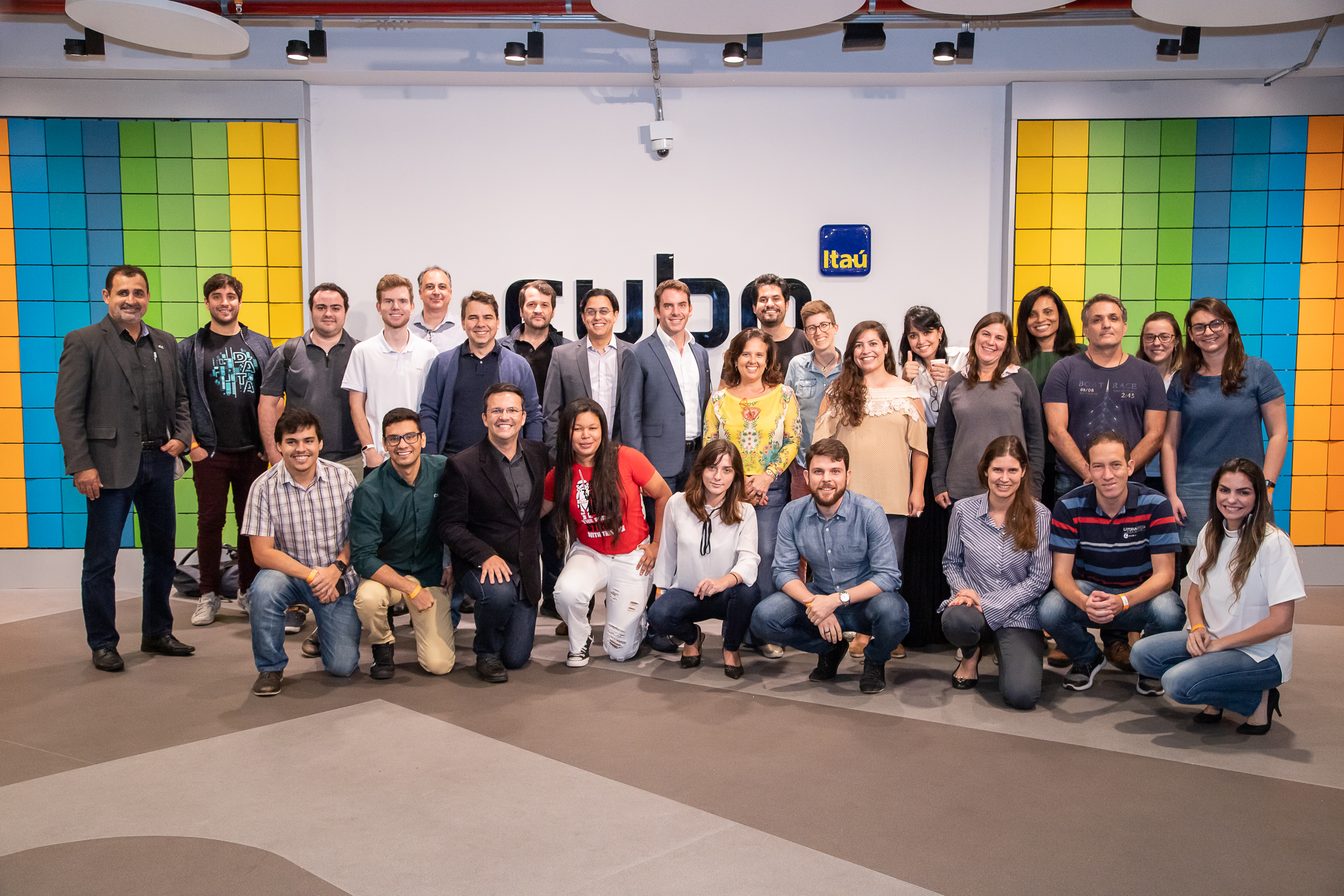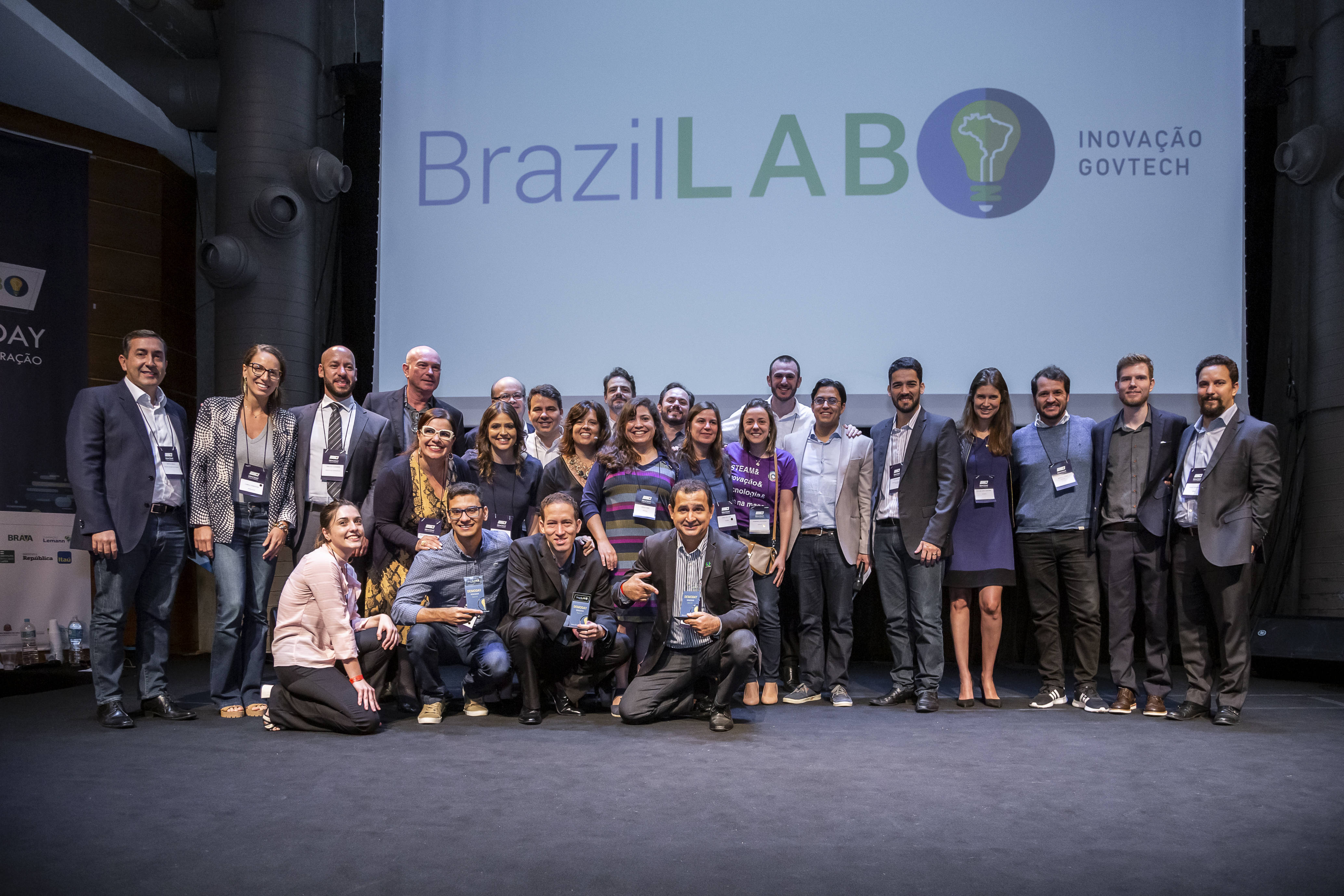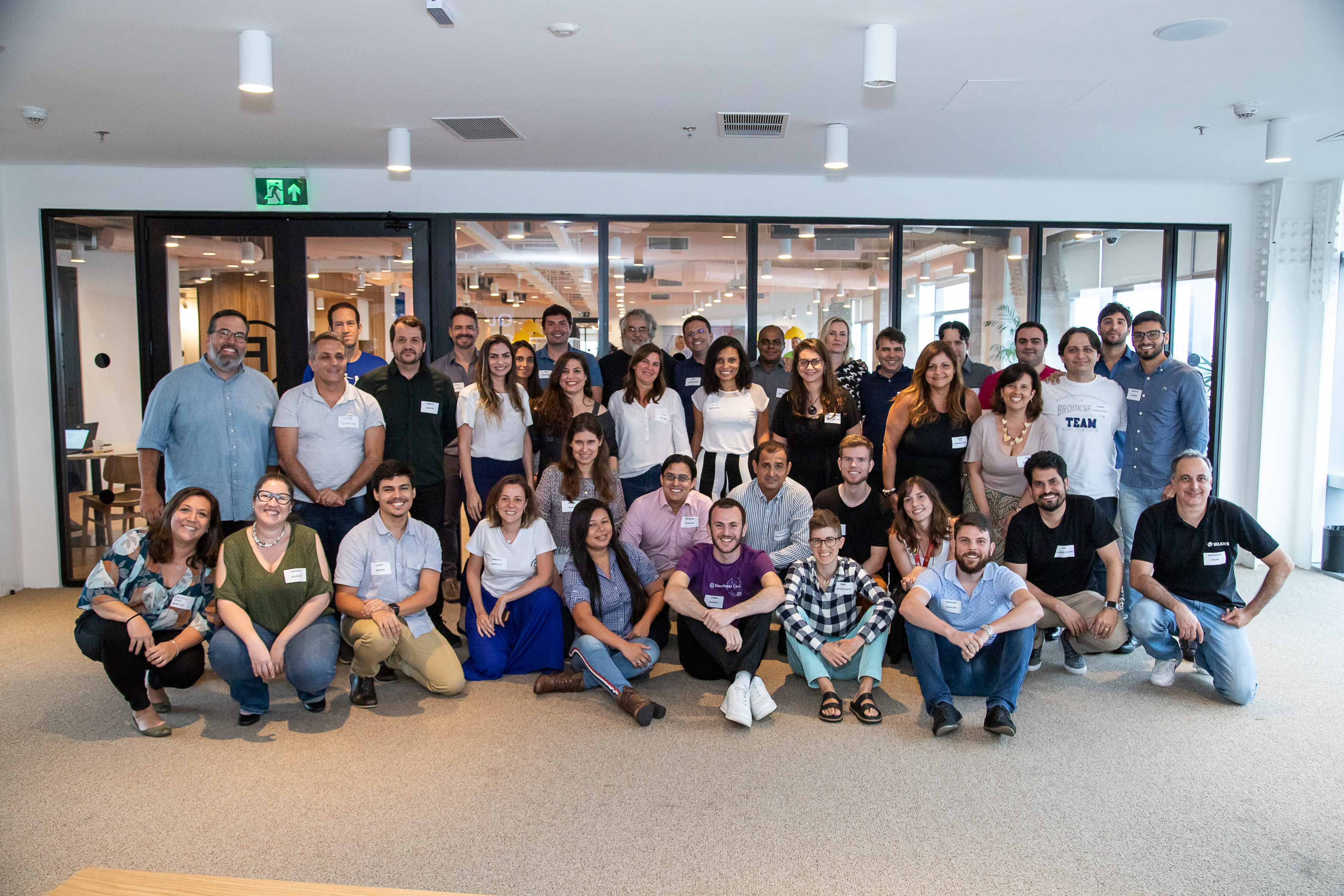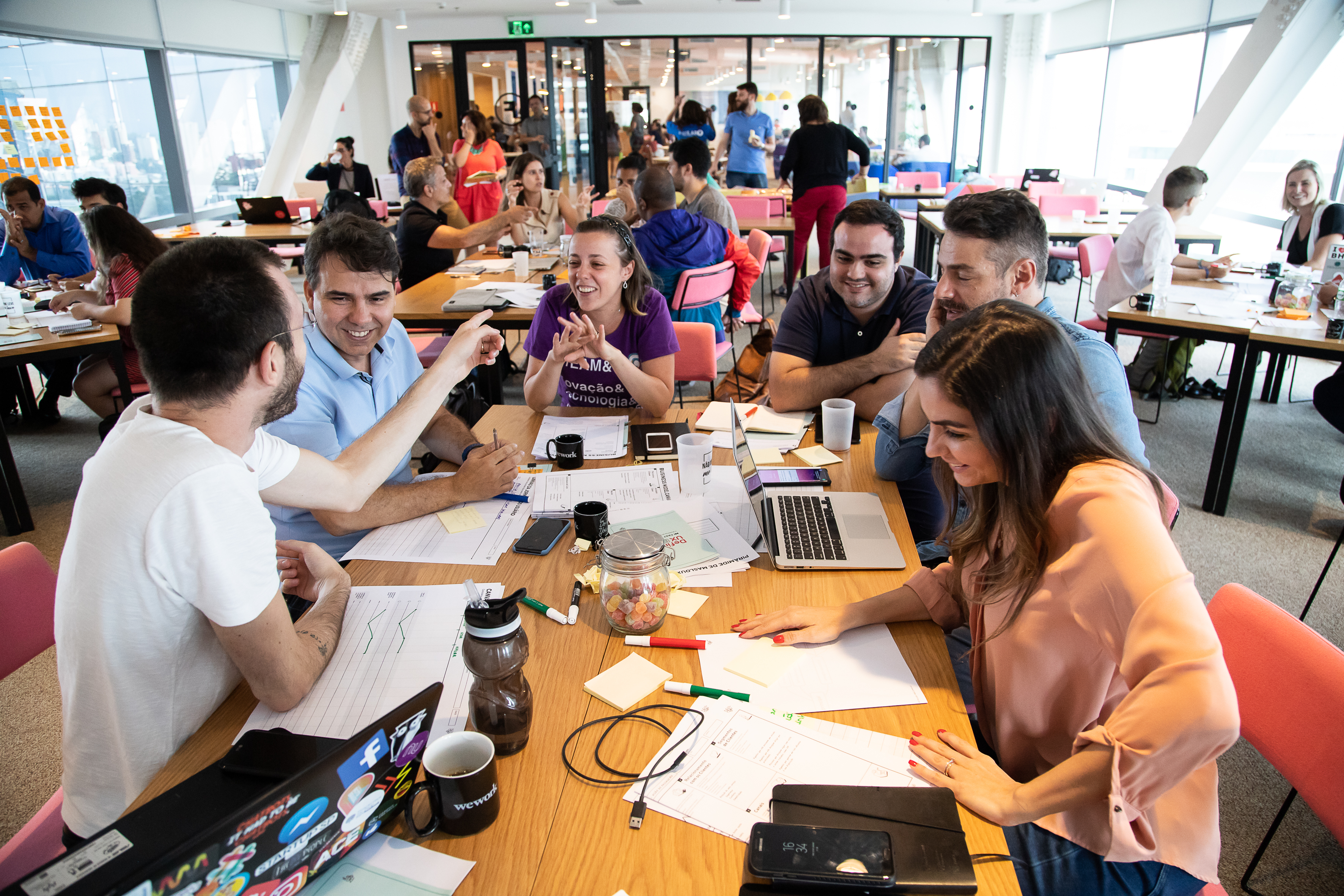 BrazilLab - © BrazilLab
BrazilLab - © BrazilLab BrazilLab at Demoday - © BrazilLab
BrazilLab at Demoday - © BrazilLab BrazilLab team - © BrazilLab
BrazilLab team - © BrazilLab Team meeting, BrazilLab - © BrazilLab
Team meeting, BrazilLab - © BrazilLab
City
São Paulo
Main actors
Local Government
Project area
other
Duration
Ongoing since 2015
Innovation hub connecting the B2G sector
BrazilLAB is a B2G (Business-to Government) innovation hub that connects entrepreneurs with public leaders and accelerates solutions developed by startups with focus on improving public services. Its goal is to stimulate an innovation culture in the public sector, by supporting high-impact entrepreneurs that are engaged in the search for solutions to complex urban issues that cities face, mainly with the use of technology. BrazilLAB administers an acceleration program that has had 3 editions, organizes events for the general public and actively participates in the ecosystem of impact entrepreneurship.
The initiative is funded by private sector donations and is supported by over 20 partner city administrations, together with a community of local ambassadors and mentors.
The inspiration for BrazilLAB's acceleration program came from international initiatives such as City Lab, Solve (Massachusetts Institute of Technology) and the Mayors Challenge (Bloomberg Philanthropies). These programs stimulate innovation, exchange, and dialogue between academics, entrepreneurs, the public and private sector, aiming to promote an efficient ecosystem that encourages the involvement of citizens in making governments work better.
The main objective of BrazilLAB´s acceleration program is to adapt and validate the selected solutions to meet the needs of city administrators and solve problems faced by local municipalities. BrazilLAB's long term plan is to become a hub that stimulates innovation inside government from outside, that will, in turn, make positive impacts in Brazilian cities through digital transformation.
BrazilLAB has implemented an acceleration program focused on the development of participating entrepeneur´s projects. In the two previous editions (2016 and 2017) BrazilLAB accelerated solutions in the following areas: health, education, government communication and urban agriculture, as well as solutions on environmental challenges and fiscal sustainability. In the third edition of the acceleration program (2018/2019), BrazilLAB seeked to engage with startups that work in the areas of leadership, health, public safety and cybersecurity, environment, entrepreneurial education and social inclusion.
Thirty companies have been selected to receive mentoring and support for the development of their projects.
The acceleration program includes four modules of face-to-face activities. In each of them, entrepreneurs receive specialized mentoring, access to experts and public leaders, information on the municipal challenges, opportunities to participate in discussions with investors and have their solutions publicised in the media.
Completing the four modules, the startups present their ideas to a group of investors and experts on a final ‘DemoDay’. The best ones receive from R$50 thousand to R$200 thousand in investment in order to improve their solutions.
The program is not restricted to face-to-face activities. BrazilLAB’s network of partners, mentors and staff are accessible to entrepreneurs throughout their journey. This monitoring takes place through an alumni program, which aims to help entrepreneurs achieve the impact they want in society.
Together with other NGOs, BrazilLAB has created a network of municipalities that are open to incorporate technology into their management. And, like the hub, they seek high-social-impact and low-cost solutions to solve their challenges.
There are over 20 partner City Halls from all regions of Brazil including Curitiba, São Paulo, São José dos Campos, Petrolina and Juiz de Fora.
BrazilLAB is an NGO, therefore, the financial help it has received though the past three years came from partners who trust in this project. The hubs major donors are: BRAVA Foundation, Betty and Jacob Lafer Institute, Itaú, Humanize Institute and Bank of America Merryl Lynch. However, the hub is already developing strategies for its sustainability from other means.
When BrazilLAB started 3 years ago the GovTech agenda was not part of the main discussions in the government. Therefore, the changes that BrazilLAB was able to make in this scenario over the past years are remarkable. Up until now BrazilLAB has accelerated 55 startups in different categories, and has implemented solutions in the prefectures of São Paulo, Curitiba, Juiz de Fora, Petrolina and Belo Horizonte. In addition, according to our research, 97% of the entrepreneurs that engaged in our program felt more prepared to negotiate with governments after their participation. 14 startups are already working with the government. 12 startups have already our GovTech certification, and the plan is to have 50 certified startups by the end of the year.
Additionally, along with ITS Rio, in 2018 we organized ‘GovTech Brazil’, the first international conference dedicated to the cause in Brazil. The event aimed to create an agenda that contemplates how Brazil must position itself in this technological revolution and what steps must be taken towards this goal.
At ‘GovTech Brazil’ 2018, we connected global leaders from different sectors and established a dialogue between: public sector leaders, legislators and public authorities, startups, entrepreneurs and private companies, investors, NGOs, civil society and the media. We had more than 700 participants, 47 lecturers, and brought five presidential candidates to to talk about the subject.
BrazilLab also participates in commissions in Congress for government simplification and digitalization and also on improving public procurement for startups solutions.
As BrazilLab’s main goal is to promote an up-to-date and technological government, it is practically a consensus that there are two major barriers to innovation in the public sector. One that we can call a legal barrier, synthesized in the absence of a legal framework that encourages new practices and new approaches in the solution of the challenges faced not only by public managers of the direct and indirect administration, but also in spheres such as the Judiciary and the Public Prosecution Service in the exercise of its constitutional attributions. Although it is paradoxical, it is worth noting that the legal barrier in some situations also occurs in the excessive regulation of certain activities and sectors, generating a chaotic overlap of legal norms.
Thus, the role that BrazilLAB has been developing to confront this challenge is to promote the agenda of the need for modernization of Brazilian legislation on issues such as hiring innovation, for example, something relevant to the public sectors, through advocacy and participation in the creation of new legislation.
In turn, the second barrier, a cultural barrier, consists of a natural inertia related to the performance of public officials. Already limited by the legal barrier and within an environment of stability, public officials have little incentive to act differently depending on the complexity of the tasks they carry out or because they have been developed for years in the same way and, for the most part of the times, with satisfactory results, even if not excellent. All this, not to mention the permanent change of leadership (especially in the Executive Branch) and the risk of personal accountability if some innovative solution is considered illegal by controlling bodies.
The main lesson learned is the importance of promoting a digital and innovative culture in government from the outside to the inside. Society has to be a relevant actor in order to secure that digital transformation in government is transparent, inclusive and also cost effective. And that can be done all over the world as long as you collaborate with good people to execute good ideas.
In our view, technology and innovation are the best tools available to overcome the challenges society faces today. Our job is to connect demand and supply, understanding the main challenges of government and offering them solutions created by startups, which are innovative and will increase their impact. We test our hypothesis, refine our methodology, and implement innovative solutions within government, creating success stories that confirm we are on the right track.
Thinking of that, we launched the ‘GovTech Seal’, in March 2019 to scale-up our activities and provide a source of revenue. BrazilLAB's ‘GovTech Seal’ platform is a great showcase for startups and for all public managers in the country, who can easily identify potential entrepreneurs to serve them.
In addition to that, we are in an advocacy movement to promote innovation at various levels of government, to build a ‘Digital Government’. BrazilLab will also carry out missions to renowned govtech centers around the world for entrepreneurs and public officials to improve their access to new informations and also assist in our financial sustainability.
External links / documents
On Map
The Map will be displayed after accepting cookie policy